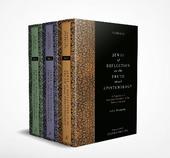
|
Jewel of Reflection on the Truth about Epistemology: A Complete and Annotated Translation of the Tattva-cinta-mani
Mixed media product
Main Details
| Title |
Jewel of Reflection on the Truth about Epistemology: A Complete and Annotated Translation of the Tattva-cinta-mani
|
| Authors and Contributors |
By (author) Gangesa
|
|
Translated by Stephen Phillips
|
| Physical Properties |
| Format:Mixed media product | | Dimensions(mm): Height 234,Width 156 |
|
| Category/Genre | Oriental and Indian philosophy
Hinduism |
|---|
| ISBN/Barcode |
9781350066533
|
| Classifications | Dewey:181 |
|---|
| Audience | | Tertiary Education (US: College) | |
|---|
|
Publishing Details |
| Publisher |
Bloomsbury Publishing PLC
|
| Imprint |
Bloomsbury Academic
|
| Publication Date |
14 May 2020 |
| Publication Country |
United Kingdom
|
Description
Jewel of Reflection on the Truth about Epistemology is here translated and explained in an invaluable contribution to the history of knowledge, making available in English the very best within the traditions of philosophical speculation and argument in India and Sanskrit over more than twenty centuries. The "Jewel" distills the best arguments and most important positions of the past and provides the dominant focus for later philosophic reflection. The achievement of a great 14th-century logician, Gangesa Upadhyaya ("Professor Gangesa"), the Tattva-cinta-mani is a masterpiece of world philosophy, impacting in classical India not only philosophy but also literary criticism, jurisprudence, and medical theory for centuries. Among scholars, it is commonly counted-with perhaps one or two Buddhist treatises and one or two in Vedanta-among the top four or five philosophic works in the whole long history of classical Indian civilization (from 500 bce to the modern period). This three-volume edition of the work marks the first time time it has been translated into English in its entirety. Becoming the focal point of the long-running Nyaya school and canonized in Sanskrit literature, it is famed, across many schools of philosophy, for cogency of argument and consistency of analysis. Focused on four "knowledge sources" recognized in Nyaya, the text covers the epistemology of perception, inference, analogy and testimony in four chapters. In this landmark translation, Stephen Phillips provides an English-speaking audience all four parts with readable translations and running commentary. He contextualizes, analyzes and translates the text into understandable prose targeting especially those working in analytic philosophy but also anyone unfamiliar with Nyaya who may want to see and make use of its findings now accessible as never before.
Author Biography
Stephen Phillips is Professor of Philosophy and Asian Studies at the University of Texas at Austin, USA, and has been Visiting Professor of Philosophy at the University of Hawaii, Manoa, and at Jadavpur University, Kolkata. He is the author and or co-author of eight books including Yoga, Karma, and Rebirth: A Brief History and Philosophy (2009), Epistemology in Classical India: The Knowledge Sources of the Nyaya School (2012), and (with Matthew Dasti) The Nyaya-sutra: Selections with Early Commentaries (2018).
ReviewsGangesa's Jewel of Reflection is a classic of world philosophy. It is one of the most important and extensive treatises on epistemology ever composed, and dominates the Indian philosophical scene since its composition in the 14th century. The text addresses every epistemological issue and position then current in India, and does so in great detail. It is impossible to understand the subsequent history of philosophy without studying it. Stephen Philips has produced a masterpiece: a complete translation of the text that is philologically precise, philosophically sensitive, and absolutely lucid and readable by any Anglophone philosopher. If you are an epistemologist or a student of Indian philosophy, there is no excuse not to read. * Jay L Garfield, Doris Silbert Professor of Humanities, Smith College and the Harvard Divinity School, USA * In this magnificent feat of scholarship, Stephen Phillips brings to a diverse readership a subtle, sophisticated, and technically precise translation of one of the most significant texts of pre-modern Indian philosophy. Sanskritists and historians of Indian ideas, comparative philosophers working with Indian materials, and Western analytic philosophers interested in opening up the cultural sources of technical philosophy , will all find much to learn from this translation. Phillips is right that this work should take its rightful place in global philosophy as a work of great depth and originality; and his translation should ensure that new philosophical projects are influenced by access to it. * Chakravarthi Ram-Prasad FBA, Distinguished Professor of Comparative Religion and Philosophy, Lancaster University, UK * This monumental work makes Gangesa's dense and intricate masterpiece accessible to a general philosophical audience. The translation is remarkably readable, and the commentary carefully sets the arguments into the context of the complex interscholastic disputes within the Indian tradition, while explaining them in terms that will be readily comprehensible to analytic philosophers. It has the potential to transform contemporary discussions in epistemology by opening a window into a philosophical tradition that has been too long neglected. * Joel S. Feldman, Associate Professor of Philosophy, Rider University, USA *
|